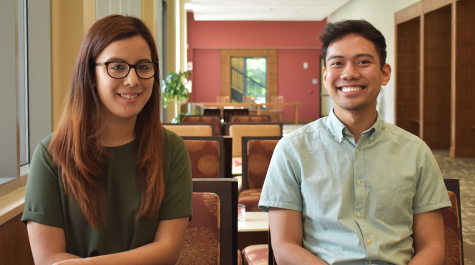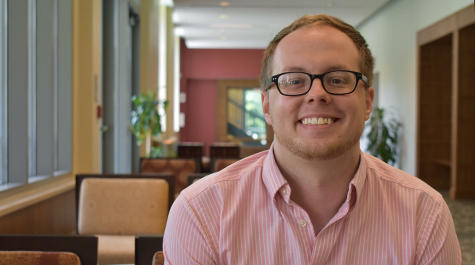Three counseling students selected as National Board for Certified Counselors Minority Fellows
One master’s and two doctoral students in the W&M counseling program have been selected as National Board for Certified Counselors (NBCC) Minority Fellows for 2017-2018. The fellowship was established to engage diverse individuals in counseling and increase the number of counselors providing effective, culturally competent services to underserved populations.
Serving the mental health needs of undocumented immigrants
Edith Gonzalez M.Ed. ’15 has long known she wanted to help Hispanic families access mental health care. Growing up as a first-generation Mexican American, she herself experienced the challenges that can arise when American culture, with its emphasis on individualism, clashes with the more collectivistic, family-centered aspects of Hispanic culture.
As a master’s student and now as a doctoral candidate in the counselor education program, Gonzalez has been committed to finding ways to promote mental health and counseling among Hispanic families—and help them find care when it’s needed. She is currently co-director of the New Horizons Family Counseling Center, which provides free counseling services to local families who could otherwise not afford it. As the only Spanish speaker working in the clinic, she serves all of the Spanish-speaking Hispanic families referred to New Horizons, in addition to supervising the master’s student interns and coordinating off-site services.
Thanks to the $20,000 NBCC fellowship, Gonzalez will have more flexibility in pursuing her dissertation study, which will focus on perceptions of mental health care among undocumented Latino immigrants.
According to Gonzalez, research exists on what interventions are effective for undocumented people, as well as how to prepare counselors for the ethical and legal responsibilities of working with this population. But there’s a lack of research on how these people view mental health care. For many, she added, mental health issues are attributed to physical illness or closely linked to their faith and religious beliefs. And for undocumented people, the constant fear of discovery and deportation is a significant stress on their mental health, as well as an obstacle to pursuing counseling and treatment.
“We, as counselors, believe in the power and effectiveness of counseling,” she said. “But if they don’t believe in counseling, or don’t know how to ask for help, we can’t meet their needs.”
The fellowship will help fund travel and resources to support her research study, which will be conducted in her native Texas among undocumented immigrants. She anticipates that the biggest challenge will be gaining the trust she’ll need within the community to find enough participants for her study.
“As counselors, we have to go out into the community to build that trust,” she said. “If I can do that, hopefully I can give voice to these people and expand the reach of mental health counseling.”
Traveling the world to provide counseling to people in need
Service trips around the world have inspired a passion for international counseling and a multicultural perspective in Victor Tuazon’s studies and research. A doctoral candidate in counselor education, Tuazon was awarded his $20,000 fellowship from NBCC to support his study of the colonial mentality (internalized oppression) of Filipino-Americans and its impact on their mental health outcomes and help-seeking behaviors.
While completing his undergraduate degree in psychology and master’s degree in clinical mental health and school counseling, Tuazon pursued service trips to work with children and families around the world. In Brazil and Mozambique, he worked with non-profit organizations providing outreach and counseling to orphans. In Romania, he provided direct trauma counseling to members of the Roma population and trained other helping professionals.
These experiences helped him hone a research focus in the areas of trauma, addiction, grief and loss, particularly among underserved and international populations. His dissertation will focus on the post-traumatic growth of people who have lost a parent during adolescence.
Tuazon is the student director of the New Leaf Clinic, which provides addiction counseling to William & Mary students, and a doctoral intern at the New Horizons Family Counseling Center.
“I’m so grateful for the NBCC fellowship, not only because it will help fund my research, but also because I’ll be able to attend conferences and pursue other professional development opportunities where I can present my work and get feedback,” said Tuazon. “It’s an honor and a tremendous opportunity for me at this stage in my career.”
Providing support to adolescents on the verge of adulthood
Nathaniel Mason is a first-year student in the master’s program in clinical mental health and addictions counseling. As a master’s level student, he’ll receive $11,000 as a NBCC Minority Fellow to support his work centered around helping adolescents and young adults from underrepresented populations.
“For many at-risk youth in this age range, issues arise as they make the transition into adulthood,” said Mason. “Substance abuse and untreated mental disorders can complicate an already difficult stage of life.”
His practicum with Bacon Street Youth and Family Services gave him opportunities to work with families and adolescents, and he also provides addiction counseling to college students through the New Leaf Clinic.
The financial support of the fellowship will allow him to complete his degree on time by taking summer courses and continue his work at Bacon Street through an internship. After finishing his master’s, he hopes to work in a community agency, helping transition-age youth dealing with substance abuse problems.
“Everyone needs help through the transition to adulthood, but it’s especially true of young people from underserved populations,” said Mason. “They need a stronger voice in the mental health community, and I hope to be one of those voices.”

